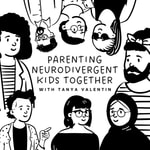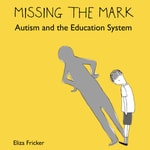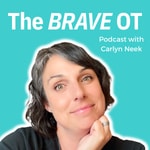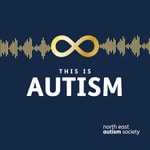From Burnout to Balance - Helping Parents Find Balance on the Burnout Recovery Journey – Détails, épisodes et analyse
Détails du podcast
Informations techniques et générales issues du flux RSS du podcast.

From Burnout to Balance - Helping Parents Find Balance on the Burnout Recovery Journey
Tanya Valentin
Fréquence : 1 épisode/16j. Total Éps: 32

Classements récents
Dernières positions dans les classements Apple Podcasts et Spotify.
Apple Podcasts
🇬🇧 Grande Bretagne - parenting
21/07/2025#96🇬🇧 Grande Bretagne - parenting
12/05/2025#83🇫🇷 France - parenting
20/11/2024#78🇩🇪 Allemagne - parenting
16/10/2024#76
Spotify
Aucun classement récent disponible
Liens partagés entre épisodes et podcasts
Liens présents dans les descriptions d'épisodes et autres podcasts les utilisant également.
See all- https://www.pdasociety.org.uk/
23 partages
- https://tanyavalentin.co/parent-community/
17 partages
- https://theautisticadvocate.com/
11 partages
- https://www.instagram.com/sendwisehub
4 partages
Qualité et score du flux RSS
Évaluation technique de la qualité et de la structure du flux RSS.
See allScore global : 48%
Historique des publications
Répartition mensuelle des publications d'épisodes au fil des années.
Understanding Interoception and Neuroception to Support Children with Elen Nathan
Saison 2 · Épisode 3
mercredi 18 septembre 2024 • Durée 01:21:01
In this conversation, Tanya and Elen delve into the concepts of interoception and neuroception, exploring how these senses impact our understanding of bodily signals and emotional responses. They discuss the importance of recognizing and responding to internal cues for self-regulation, particularly in neurodivergent individuals. The conversation also highlights the significance of creating safe environments and understanding survival responses, such as fight, flight, freeze, and fawn. Finally, they emphasize the need to find glimmers of joy in everyday life to support emotional well-being and resilience.
- Interoception is our sense of what's happening inside our body.
- Neuroception is our sense of safety and danger.
- Everyone has sensory systems, and understanding them is crucial.
- Self-regulation starts with noticing internal sensations.
- Not everyone receives interoceptive messages reliably.
- Children may struggle with recognizing bodily cues due to various factors.
- Trauma can impact one's ability to sense internal messages.
- Finding glimmers of joy can enhance emotional resilience.
- Practicing self-regulation strategies when calm is more effective.
- Understanding survival responses helps in supporting children.
Chapters:
00:00 Introduction and Overview
03:12 Understanding Interoception and Neuroception
06:36 The Impact of Interoception on Daily Activities
14:29 Challenges and Variations in Interoception
19:13 Being Trauma-Informed in Interoception Work
27:27 Strategies for Developing Interoception Awareness
40:23 Supporting Children in Using Self-Regulation Strategies
50:00 Understanding Neuroception: Our Sense of Safety and Danger
55:41 The Different Threat Responses: Mobilization and Immobilization
01:13:37 Signaling Safety to Children: Tuning into Glimmers and Moments of Joy
You can connect with Elen Nathan here:
Website: https://theplayfulplace.co.nz/
Facebook: https://www.facebook.com/ThePlayfulPlace
Click here to find out more about the Neurodivergent Family Toolbox
If you would like to join the conversation by being a guest on the show, please email Tanya at tanya@tanyavalentin.com.
Advocating For Inclusive Education With Aleesha White
Saison 2 · Épisode 2
jeudi 5 septembre 2024 • Durée 35:06
Aleesha White, founder of Moody, shares her journey of supporting neurodivergent individuals and their families.
She discusses the challenges she faced as a high school student with seizures and her subsequent passion for helping neurodivergent people.
Aleesha emphasizes the importance of creating inclusive opportunities and supporting neurodivergent individuals outside of the traditional classroom environment.
She also highlights the need for neuro-affirming strategies in education and offers advice for educators and parents. Moody aims to provide a supportive platform for teachers, students, and parents on their neurodiverse journey.
What we chatted about on the show:
- Supporting neurodivergent students requires creating inclusive opportunities and focusing on their well-being and mental health.
- Neurodivergent students may face challenges in traditional classroom environments, and it is important to provide support outside of the curriculum.
- Teachers can make a positive impact by modifying and differentiating their teaching strategies to meet the needs of neurodivergent students.
- Parents can advocate for their neurodivergent children by establishing open communication with teachers and sharing concerns and successes.
- Moody aims to provide a supportive platform for teachers, students, and parents, offering resources and strategies for the neurodiverse community.
Chapters:
00:00 Introduction to Aleesha White and Moody
01:27 Creating Inclusive Opportunities for Neurodivergent Individuals
04:17 Supporting Neurodivergent Students Outside of the Classroom
09:06 Neuro-Affirming Strategies for Educators
16:10 Advocating for Neurodivergent Children: Tips for Parents
22:47 Moody: A Supportive Platform for the Neurodiverse Community
Connect with Aleesha:
Free guide: empowering parents of neurodivergent children https://moody.myflodesk.com Instagram @themoodydifference
The full transcript for this episode is available HERE
Find out more about The Neurodivergent Family Toolbox
Navigating Late Diagnosis In Mid-Life With Claire Fisher
mardi 19 mars 2024 • Durée 47:00
On today's episode, we chat with Claire Fisher. Claire shares with us her journey after being diagnosed in her forties with ADHD and Autism.
Here are some of what we chat about in this episode:
- What led her to seek an ADHD/Autism assessment for herself in midlife?
- What this process was like for her and how this led her to seek assessment and support for her children.
- Her lived experience with navigating the mental health system and support in New Zealand.
- Her advice for others who are navigating the system or contemplating assessment.
- Her wisdom about navigating the education system from her lived experience with her children and transitioning from parenting teens to young adults.
It was an absolute pleasure to speak with Claire and we can all learn so much from her lived experience.
If you would like to join the conversation by being a guest on the show, please email Tanya at tanya@tanyavalentin.com. Click here to find out more about the Neurodivergent Family Toolbox
Chronic Illness, Cycles and Rest With Rebecca Rae-Hodgson, The Chronically Resilient OT
Saison 1 · Épisode 2
lundi 11 mars 2024 • Durée 39:55
Today on the show we sit down with Rebecca Rae-Hodgson who you might know as The Chronically Resilient OT.
In this episode, we chat about:
- What it was like for her to discover that she was neurodivergent as an adult.
- Her journey with chronic illness.
- How neurodivergence, chronic illness, cycles, fertility and executive function all impact each other.
- How we can embrace the different types of rest we need as neurodivergent humans.
Here are ways to work with Rebecca or access her blogs and resources:
- Website: https://www.chronicresilienceot.com/
- Facebook: https://www.facebook.com/thechronicallyresilientot
Click here to find out more about the Neurodivergent Family Toolbox
If you would like to join the conversation by being a guest on the show, please email Tanya at tanya@tanyavalentin.com.
Let's Start This Journey Together
Saison 1 · Épisode 1
vendredi 8 mars 2024 • Durée 20:49
In this episode, Tanya Valentin shares her journey as a neurodivergent human raising other neurodivergent humans.
Tanya shares why the inspiration behind creating the Parenting Neurodivergent Kids Together Podcast and what it is about.
If you would like to join the conversation contact Tanya via email at tanya@tanyavalentin.com.
You can find out more about The Neurodivergent Family Toolbox HERE
Changing Bedtime From Stress Filled To Connection Filled With Laura Hellfeld
Saison 2 · Épisode 1
jeudi 29 août 2024 • Durée 57:38
For many parents of neurodivergent children, bedtime is one of the hardest and most stressful times of the day. If this is true for you and your family, you're not alone, as many neurodivergent individuals find sleep challenging.
In this episode, I chat with Laura Hellfeld, neurodivergent nurse and sleep consultant.
Here are some of the topics we discussed:
- Changing the paradigm from traditional parenting perspectives on sleep and bedtime to a more connection-oriented approach.
- Helpful insights to support parents at bedtime.
- Giving yourself permission to listen to your child and your intuition and take the road of least resistance at bedtime.
To Follow Laura’s Work
Resources
Creating Safe Spaces for Autistic People paperback
Creating Safe Spaces for Autistic People Ebook
Autistic Revolution online magazine
Find out more about the Neurodivergent Family Toolbox
Exploring ARFID with Elen Nathan from The Playful Place
mardi 28 mai 2024 • Durée 01:05:26
Today, I am joined by Elen Nathan from The Playful Place to give us insight into ARFID (Avoidant Restrictive Food Intake Disorder).
Here is what we chatted about:
- What is ARFID?
- What causes ARFID and how can we know if our child (or we) are affected by ARFID?
- What can we do as parents to support our children if they are affected by ARFID?
If you missed Elen's other two episodes on Sensory Systems here are the links:
https://spotifyanchor-web.app.link/e/78epUpjiXJb
https://spotifyanchor-web.app.link/e/tG4jyrjiXJb
You can connect with Elen Nathan at:
https://www.theplayfulplace.co.nz
Click here to find out more about the Neurodivergent Family Toolbox
If you would like to join the conversation by being a guest on the show, please email Tanya at tanya@tanyavalentin.com.
Making Sense of Our Emotions
mercredi 15 mai 2024 • Durée 35:33
In this solo episode, I talk about a topic that is often shut down in parenting communities. The topic of experiencing grief for various aspects of our parenting journey. In our Instagram society, where we just see the highlights, the happy moments the joyful moments of parenting we can feel 'wrong', 'broken' and isolated because we aren't feeling or experiencing these things. There can be many times when we wish things were different. I have often felt like this but have not had the language to talk about my experience until I came across the Five Gates of Grief by Francis Weller. In this episode: I talk you through these five gates of grief and how they could relate to you. I share with you the three-step process I use when I am processing difficult emotions. If you experience grief over aspects of your parenting journey then I hope that you feel seen by what I share in this episode.
Frances Weller’s deep and profound work can be accessed here: https://www.francisweller.net
Click here: https://tanyavalentin.co/the-neurodivergent-family-toolbox-week-by-week-breakdown/
to find out more about The Neurodivergent Family Toolbox.
You can contact me on Instagram and Facebook @tanyavaletinnz to chat about the Neurodivergent Family Toolbox or the contents of this show
Supporting Your PDA Child With Kate Kleinau
jeudi 9 mai 2024 • Durée 43:15
Today on the show I chat with Kate Kleinau, who you may know from her Facebook and Instagram accounts as Raising PDA Kids.
In this episode, Kate and I chat about:
- How her son's autistic burnout in his early childhood years led her to discover that he was PDA.
- The things she and her husband did to support her son's recovery from burnout.
- How embracing radical acceptance and adapting the way she parents her children has led to calmer, connected moments with her son.
- Her work supporting other PDA mums.
Does this resonate for you?
Do you think your child might be PDA? The PDA Society has some great resources: https://www.pdasociety.org.uk/ You can find out more about Kate's work here: https://raisingpda.com/ Connect with her on Facebook and Instagram at Raising PDA Kids- Kate Kleinau, OT
Click here to find out more about the Neurodivergent Family Toolbox
If you would like to join the conversation by being a guest on the show, please email Tanya at tanya@tanyavalentin.com.
Enabling Your Good Life With Pip Brunn
lundi 29 avril 2024 • Durée 01:06:04
Today on the show we chat with Pip Brun, a neurodivergent human, a mum of 6 and a passionate advocate for the rights of disabled people.
Pip is a passionate member of the Enabling Good Lives mid-central leadership group in New Zealand.
In this episode, we chat about:
- Pip's lived experience as a mum of 6 neurodivergent children (including her daughter Lucy who has a rare chromosome disorder).
- The Enabling Good Lives approach and its guiding principles and what these mean for us in our lives.
- How we can live these principles in our own lives and use this approach to empower us to advocate for ourselves and our loved ones.
Additional information and resources for the Enabling Good Lives Approach:
https://www.enablinggoodlives.co.nz
Good Start To Life Practice Guidance:
//www.hqsc.govt.nz/assets/Consumer-hub/Partners-in-Care/Publications-resources/Good-start-in-life-practice-guidance-Mar-2020.pdf
https://www.msd.govt.nz/about-msd-and-our-work/publications-resources/monitoring/uncroc
https://www.enablinggoodlives.co.nz/system-transformation/mid-central-updates/midcentral-leadership-team/pip-brunn/
Click here to find out more about the Neurodivergent Family Toolbox
If you would like to join the conversation by being a guest on the show, please email Tanya at tanya@tanyavalentin.com.









